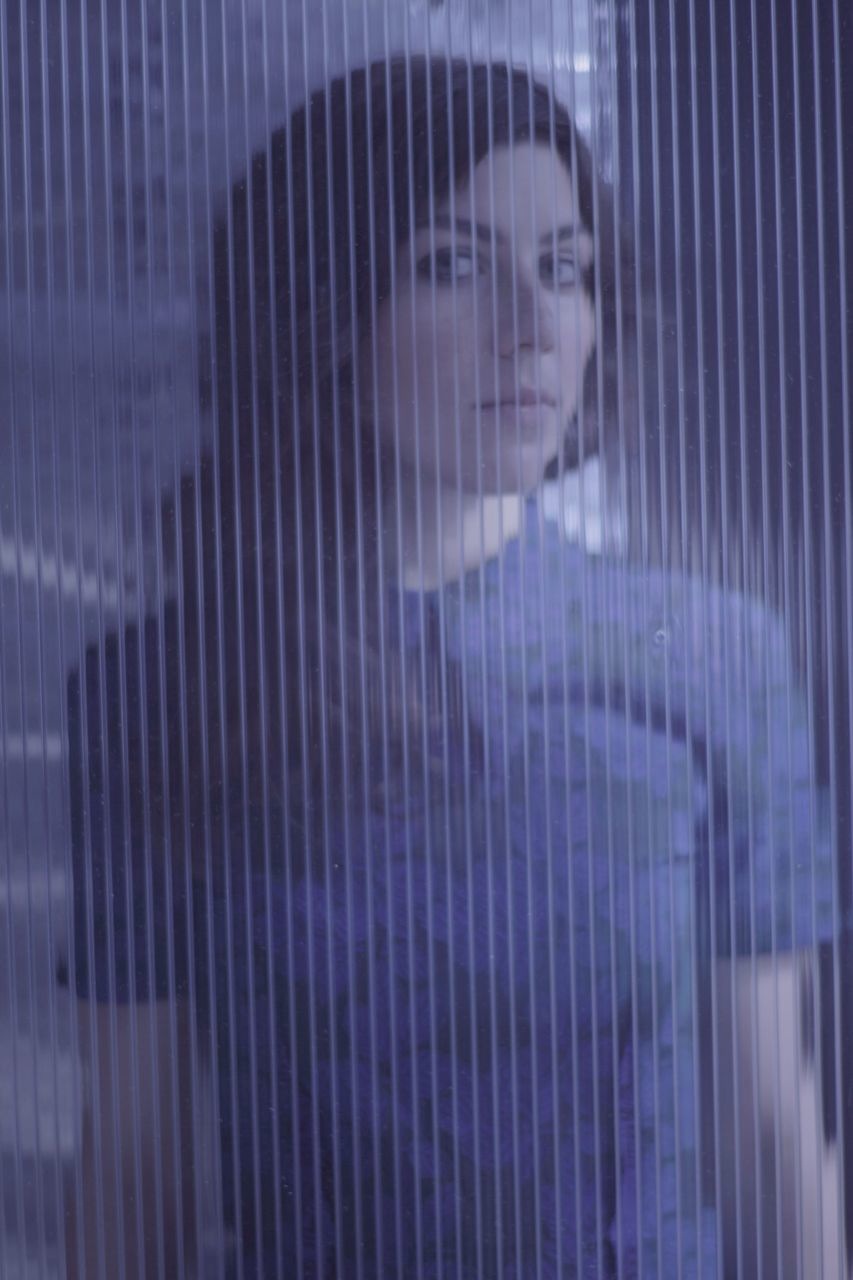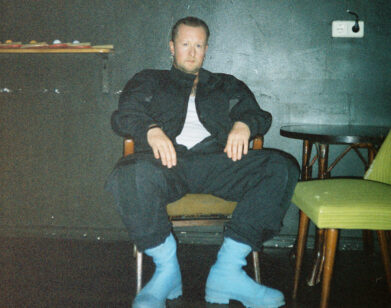Julia Holter’s Stories from the Loud City

ABOVE: JULIA HOLTER. IMAGE COURTESY OF LUKE GILFORD
“People [call my music] ‘chamber music,’ but I don’t think that’s quite right,” says Julia Holter. She’s talking about her new record Loud City Song—the third album of painstakingly constructed experimental pop that she has released in as many years. “I always like to create some kind of atmosphere,” she continues. “It doesn’t inspire me to think about the genre or style.”
Holter’s disregard for easily identifiable tropes has made her a hard musician to pin down. Her first record, 2011’s Tragedy, focused on the story of Euripides’ Hippolytus—not your usual pop subject matter. She then released Ekstasis, on which she further refined her songwriting and advanced her gauzy bedroom recording techniques. “I’m really just obsessed with production,” she says.
Loud City Song, however, is her most ambitious record yet. Inspired by the musical Gigi (based on the book by Colette of the same name), Holter takes on contemporary celebrity culture through the lens of turn-of-the-century Paris. (“I never talk about, like, Kim Kardashian, though,” jokes Holter.) The new album is also the first time Holter has stepped outside her bedroom to record in a professional studio. To do so, she teamed up with producer and former Ariel Pink‘s Haunted Graffiti member Cole M. Greif-Neill, who helped her achiever the album’s specific vision. “I basically had this world I wanted to create, and Cole just helped me realize [it],” she says.
We caught up with the L.A.-based artist to talk about her new record, the paparazzi, and why her music is more modern than you’d think.
NATHAN REESE: Loud City Song marks three albums in three years. Has it been hard keeping up that pace?
JULIA HOLTER: For me it’s seemed like a long time [between albums]. I was working on Tragedy starting in 2009, so that was four-years-ish ago. I wouldn’t do something unless I felt ready and into doing it. I haven’t forced myself to do anything I don’t want to do… it just happens. It’s felt like a good amount of time.
REESE: Before I had actually heard Loud City Song, I read that it was your first album you had recorded in a studio. When I did hear it, though, I was surprised by how similar it sounded to your past recordings.
HOLTER: I think [recording in a studio] only made it a much easier experience for me. I was able to do all of the things that I wanted to do in the past but better, arrangement-wise. We recorded for six days in the studio with instruments. After that was the big process, which was Cole and me producing for months. I made a whole bunch of demos for this record, and it’s actually still very similar to them. He’s just really good with EQs and the details of sound. If I want my voice to be brought out in the highs, he does it very intricately, whereas I would have just made a heavy-handed move.
REESE: Has more live instrumentation on the album translated to a different setup for your shows?
HOLTER: Yeah, now we have sax, violin, cello, drums, and me. It’s really exciting! For years and years I played solo. Then last year I stared with cello and drums. That was scary at first. I actually freaked out and was like, “Oh, this sounds terrible.” Not because they were being terrible, but because I was afraid. I was really used to working alone and felt really self-conscious, but then it blossomed and was amazing. I think working with this many people will be more exciting in some ways, because there’s so many rich timbres with the saxophone added to the group. It really blends into the synthesizer and acoustic instruments well.
REESE: Now that you’re making music with so many players, do you see it as a return to your music-school days?
HOLTER: Yeah, maybe it is. You have to explain things more and communicate, which is what school is about and why I don’t work well in school. My tendency was to hide—I actually didn’t work with people much in school, which is what you should do. At least with music I’m not a very academic person and I find it hard to explain what I’m doing. I prefer to work with mystery, but that doesn’t work well in an academic environment. They want you to analyze what you’re doing, which is toxic to the creative process for people like me. For some people it’s not, and they make great work in an academic environment.
REESE: Your first two records were based on ancient historical time periods. Was it a change to tackle a slightly more modern subject matter?
HOLTER: I actually think it’s really similar. Tragedy and Loud City Song are both inspired by stories from the past. To me it wasn’t so different working with turn-of-the-century Paris than it was with antiquity. In both cases I didn’t focus on those time periods much… I wasn’t thinking historically or anything. I was just looking at the contents of the story, the dynamics between the characters, and, to some extent, the society they were in—but just particular aspects that relate to our society today.
Every project I do is going to be different. Ekstasis it has a Greek title, but I didn’t think that it would be similar to Tragedy in people’s minds. It didn’t connect that people would think I was, like, a Greek scholar something. That record, to me, is really [in the] present. I kind of think of Loud City Song and Ekstasis as being similar in their approach, and Tragedy as being more of a collection of songs.
REESE: Even though you say your records seem contemporary to you, a lot of the sounds that you choose—whether it’s harpsichord or other sampled instruments—recall older types of music.
HOLTER: I see it as timeless. I don’t worry about it at all. It inspires me to think about what’s going on poetically. I don’t use the harpsichord because it evokes a past time period, I use it because I like the sound. In the subconscious, whether you’re aware of it or not, there are certain things you’re inspired by or influenced by. I love early music. I totally understand that you can’t isolate certain sounds from their context, and harpsichord is a sound that has a very particular association to a lot of people, so I can’t help that. But I don’t consciously make decisions about instrumentation based on time period.
REESE: Can you tell me a little bit about the inspiration and story behind Loud City Song specifically?
HOLTER: When I was writing Ekstasis I had this song I was working on called “Maxim 1” that was inspired by a scene in the musical Gigi where she walks into a bar and everyone stares at her and they’re gossiping about her. There’s a really interesting part in it where the audience in the bar starts whispering and chanting all together in unison. It’s really cool sonically and it’s very theatrical.
I had been doing so much heavy, introspective stuff that I thought it would be cool to recreate that scene in a more contemporary way. I made the song and I was like, “This doesn’t fit on this record at all.” It just didn’t work. It needed its own context. I decided to make a whole new record with that song on it. I thought about how I grew up watching this musical Gigi. I could do tons of the stuff with the story because I knew it so well. I thought about how that scene appealed to me and how I could apply it to my contemporary situation.
REESE: Do you see the culture of Gigi relating to our current fixation with celebrity?
HOLTER: I haven’t had any experience with being gossiped about, but it seems like there’s always a celebrity culture. Even back then there was a weekly edition of a newspaper that I reference in the liner notes, where each week the cover was an illustration of the latest gossip, intrigue, romance, whatever. Today it’s way more extreme and in your face—that’s why the record is called Loud City Song. If you’ve ever seen paparazzi go after a celebrity, it’s really freaky. It looks like they’re going to kill them.
REESE: It really does. I saw Kristen Stewart and Robert Pattinson get chased at Coachella this year.
HOLTER: That’s what “Horns Surrounding Me” is about. It’s so gross and scary.
LOUD CITY SONG IS OUT NOW VIA DOMINO RECORDS. FOR MORE ON THE ARTIST, VISIT HER WEBSITE.






